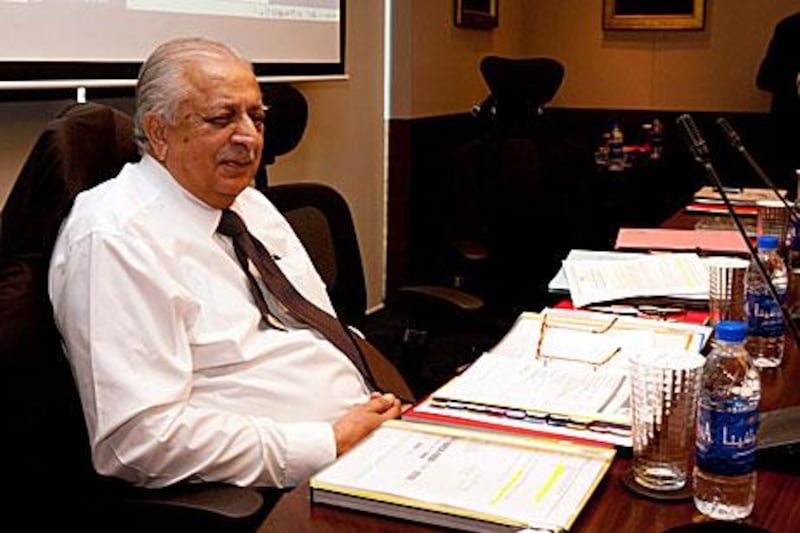The many chairmen of the Pakistan Cricket Board (PCB) have done many strange things over many years. None, if memory recalls correctly, have appointed themselves to the post though as Zaka Ashraf, the new-chairman-who-isn't-yet, has done.
Currently, Ashraf is the chairman according to himself.
He has already been on television talking about his plans, how he wants Pakistan to play India again, about how he wants to improve the team's image.
Yet last night, the spokesman for the Pakistan president, Asif Ali Zardari - who appoints the chairman - had denied any change had taken place.
A senior PCB official would only concede that "it seems to be that he [Ashraf] is".
You could make this stuff up, but it would be shot down for being too farcical. Another has said the only undeniable fact is that Ijaz Butt's tenure has ended.
Ashraf probably will become chairman, but already he feels like the punchline to an untold joke. How will he fare?
Long ago it became futile to predict how men would cope with the chairmanship.
Former cricketers came and failed, so did army generals, diplomats and technocrats. Ashraf is a banker and businessman, two types always to be wary of.
On paper, Butt was nearly perfect, an ex-cricketer with plenty of administrative experience in cricket and business, but paper is nearly redundant these days.
No chairman has done as much harm to Pakistan, in alienating the board, in estranging its own players and in creating such an unstable, abrasive environment.
It would be churlish to overlook that, one-on-one, Butt was an entirely different beast to how he was in a gathering, especially a hostile one. He could be as articulate, witty and clear-headed in the former as he could be defensive, growling and incoherent in the latter.
The oscillation itself was evidence of how unsuitable he was. Maybe he was too old for it. Most definitely he was too old-fashioned for it.
To this serious disrepair comes Ashraf and despite not knowing anything about him or his capabilities, it is not too cynical to wonder whether he will last the constitutional three-year term.
The uncertainty is nothing to do with him.
By 2013, the International Cricket Council wants movement on the democratisation of all cricket boards; arbitrary appointments are on their way out, transparent elections on the way in.
More significantly, that is the likeliest year for general elections in Pakistan. If Zardari goes, it is likely so too will all his appointments.
The fruits of succeeding such a poisoned tenure, however, is that he arrives to considerable goodwill and great relief.
With haste, he will need to find a coach and maybe even a captain to last beyond the 37-year-old Misbah-ul-Haq.
Relations with players will need to be mended so that they resemble less that of master-serf, and with other boards so that the PCB no longer remains an outcast.
All this, and much more, and he might not even be chairman.
FIVE FAUX PAS FROM BUTT
Attack on Sri Lanka team – March 2010
Having failed to provide adequate security to the visiting team bus, Butt first blamed the government for a lapse in which six members of Sri Lanka's squad were injured and eight security officials and civilians were killed. He then accused Chris Broad of lying about the lax security provided to him and other match officials.
Players punished, then cleared – March 2010
After a disastrous tour of Australia, Butt banned and fined seven players. Younis Khan and Mohammad Yousuf were banned indefinitely, while Shoaib Malik and Rana Naved-ul-Hasan were banned for a year. Shahid Afridi and the Akmal brothers were fined heavily. By June, all bans had been revoked and fines reduced.
The spot-fixing scandal – August 2010
Butt claimed a conspiracy had been hatched when three Pakistan players were implicated in the Lord's Test spot-fixing scandal. He did not suspend them, so the ICC did. Later he countered by claiming there is "loud and clear talk in bookie circles that some English players have taken enormous amounts of money" to lose an ODI. Ten days later he apologised.
ICC threatens expulsion – October 2010
Noting the deterioration of governance under Butt, a two-day ICC meeting concludes by, effectively, threatening to suspend Pakistan's membership should they not clean up their act.
Afridi spat – March 2010
After a World Cup semi-final, Butt rewards Shahid Afridi by removing him as leader, after differences emerge with coach Waqar Younis. Afridi retires and takes the board to court, before an uneasy peace is reached. In three years, that is the ninth change of leadership under Butt.
Follow
The National Sport
on
[ @SprtNationalUAE ]
& Osman Samiuddin on
[ @OsmanSamiuddin ]





